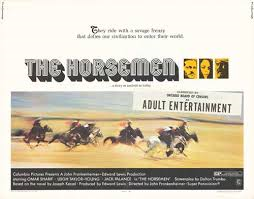
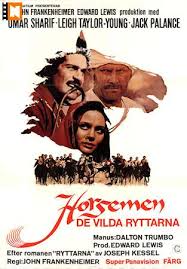
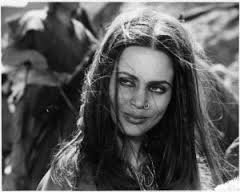
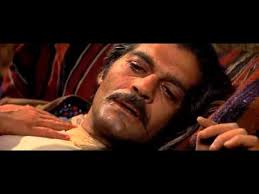
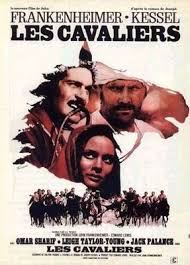
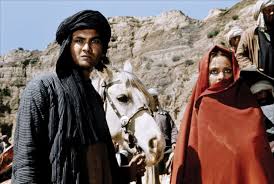
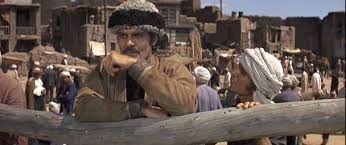
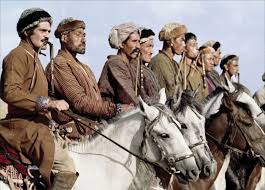
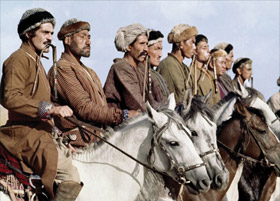
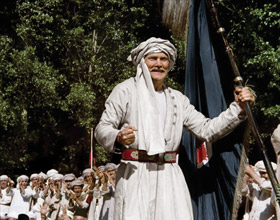
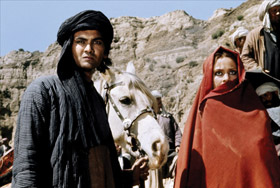
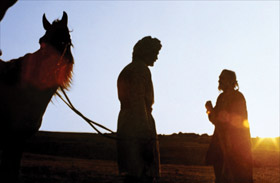
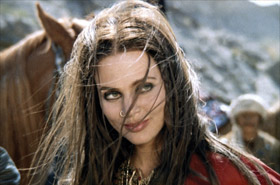
The Horsemen is a 1971 film starring Omar Sharif, directed by John Frankenheimer; screenplay by Dalton Trumbo. Based on a novel by French writer Joseph Kessel, Les Cavaliers (The Horsemen) shows Afghanistan and its people the way they were before the wars that wracked the country, particularly their love for the sport of buzkashi.
Jack Palance plays Tursen, a renowned, retired buzkashi player, who is disappointed in his son Uraz (Omar Sharif). The film was filmed in Afghanistan and Spain.
This 1971 film from John Frankenheimer (The Train, The Manchurian Candidate), set in Afghanistan and based on the book by Joseph Kessells, centres around the ancient horseback game of Buzkashi, a tough sport, with a strict code of honour, that is a way of life for its players. Omar Sharif plays Uraz, a man trying to forge his own identity in the shadow of his father (Jack Palance), the greatest horseman in Afghanistan. After injuring his leg during an important tournament, which he loses, Uraz sets out on a dangerous path to self-discovery and, ultimately, glory.Cast
Jack Palance, Leigh -Young, Omar Sharif.
布玆卡茲,即叼羊,是阿富汗普什圖人民族運動,但也存在於烏茲別克族,哈扎拉族,塔吉克人,吉爾吉斯人,哈薩克人,土庫曼人之間。
布玆卡茲經常被比作馬球,把選手分為兩隊(每隊十人),一小時內在馬背上爭奪一頭小牛或小羊的屍體,獲勝一方有奨。小羊也被烹吃以獲幸運。
本片根據同名小說TayloThe Horseman 阿富汗實地歷經1年春,夏,秋,冬,實景拍攝,
片中反映阿富汗強烈遊牧民族精彩生活習俗,尤其是馬上奪羊活動,精彩萬分,另眼相看,男主角因為馬上奪羊失敗,傷其右腿,無顏面對江東父老,遠走他鄉,後因好朋友救助,雖然失去1腿,但也鼓勵其求生存的意志力,這也反映出阿富汗民族堅強的民族,求生存發展的意志力,本片拍攝的年代,正值阿富汗王朝昏庸混亂的時代,由於長久以來,阿富汗受大英帝國殖民主義的控制,貴族,富人與窮人之間的差距天壤之別,本片當時台灣拒演禁片?
本片許多場景顯示出,阿富汗當年實際的生活,諸如鬥羊,鬥駱駝,以及市集的生意,好不熱鬧,只是好景不常,阿富汗連續政變,國王遭罷黜遠走高飛,軍閥混戰,爭權奪利,最終導致1978年蘇聯入侵阿富汗長達8年,以後內戰再起,由英,美諸國進軍阿富汗至201410月為止.
現如今戰爭結束,阿富汗新政權建立,謀取和平發展,由中國協助,全面重建阿富汗,相信3-5年之後的阿富汗,必然恢復往昔的片中場景,歡樂,富足,人們臉孔再度,展現出遺失已久的笑容.ˊˊ...筆者計劃5年後遊走阿富汗及中亞5國屆時將有精彩可期的報導.敬請讀者們期待...
Buzkashi plays a central role in The Horsemen. Tursen (played by Jack Palance), who lives in a poor northern province of the country, is considered 'the greatest chapendaz who ever lived' and that mantle may soon be passed to his son, Uraz (Omar Sharif), at the upcoming royal buzkashi on the outskirts of Kabul. They are proud men whose lives revolve around the game and its almost ancient notions of honour, heroism and masculinity. When Uraz fails to win the tournament he decides that he must prove his manhood through other means and so takes the most perilous route home imaginable - a mountain trek that sees him contend with extremities of climate and terrain as well as the broken leg he picked up (and refused medical treatment for) during the game.
Buzkashi or kokpar (literally "goat bashing" in Turkic, buz is Turkic for "goat" and kashi "means bashing")[] is the Central Asian sport in which horse-mounted players attempt to drag a goat carcass toward a goal. Traditionally, games could last for several days, but in its more regulated tournament version also has a limited match time.
Buzkashi is played amongst Kyrgyz, Pashtuns, Kazakhs, Uzbeks, Hazaras, Tajiks, and Turkmens. The Turkic name of the game is Kökbörü; Kök "blue", börü "wolf", denoting the grey wolf – the holy symbol of the Turkic people. Other Turkic names of the game are Ulak Tartish, Kuk Pari, Kök Berü, and Ulak Tyrtysh. In the West, the game is also played by Afghani Turks (ethnic Kyrgyz) who migrated to Ulupamir village in the Van district of Turkey from the Pamir region. In western China, there is not only horse-back buzkashi, but also yak buzkashi among Tajiks of Xinjiang.[]








